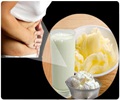
‘Use of donor milk as supplements did not improve neurodevelopment in very low-birth weight infants.’
Tweet it Now
For many VLBW (less than 3.3 lbs.) infants, there is insufficient mother's milk, and a supplement of pasteurized donor human milk (donor milk) or preterm formula is required. With an increasing awareness of the benefits of mother's milk, use of donor milk as a supplement has increased substantially in North America. The Human Milk Banking Association of North America estimated that its members dispensed 3.8 million ounces of donor milk in 2015. Despite this shift in practice, there are limited data evaluating the efficacy of "nutrient-fortified" donor milk compared with preterm formula.Deborah L. O'Connor, Ph.D., R.D., of the Hospital for Sick Children, Toronto, and colleagues randomly assigned VLBW infants to be fed either nutrient-enriched donor milk or formula for 90 days or to discharge when mother's milk was unavailable. Infants were from 4 neonatal units in Ontario, Canada.
Of 840 eligible infants, 363 (43 percent) were randomized (181 to donor milk and 182 to preterm formula); of survivors, 299 (92 percent) had neurodevelopment assessed. Average birth weight and gestational age of infants was 2.2 lbs. and 28 weeks, respectively, and 54 percent were male. The researchers found that there were no statistically significant differences in average composite scores on measures of cognitive, language, or motor skills between groups.
"If donor milk is used in settings with high provision of mother's milk, this outcome [neurodevelopment] should not be considered a treatment goal," the authors write.
The researchers note that a recent systematic analysis of randomized studies found that donor milk as a supplement to mother's milk did however reduce the risk of necrotizing enterocolitis, a severe gastrointestinal emergency. A similar reduction was found in the current study with the use of nutrient-enriched donor milk.
Advertisement
Source-Eurekalert















